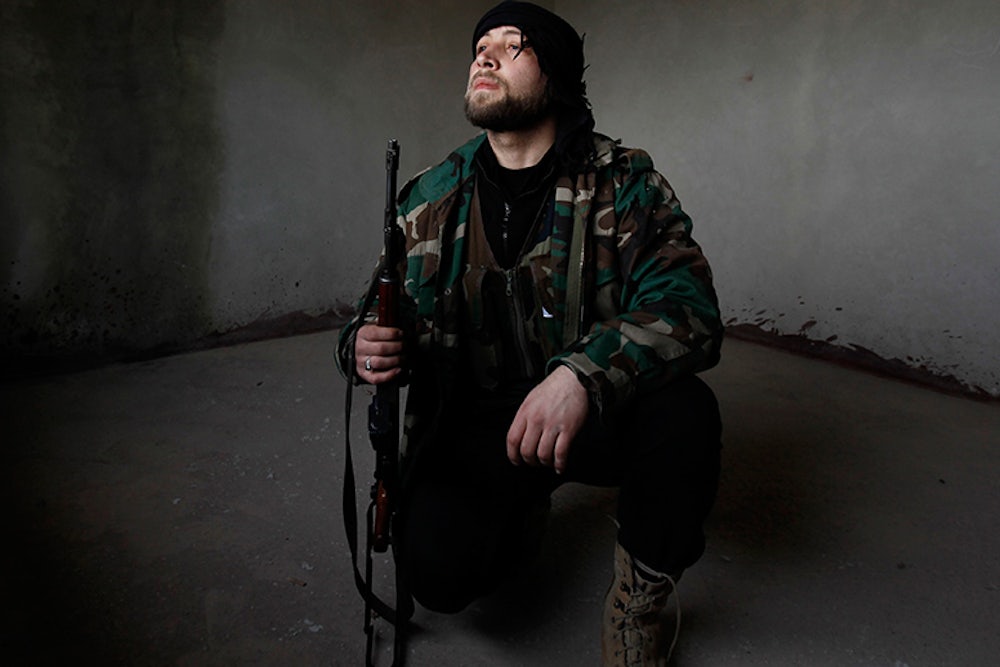Syria’s civil war is causing problems in the European Union. As the fighting has grown more and more brutal, and as reports of human-rights atrocities committed by Bashar al-Assad’s regime have spread, the war has become an attractive destination for a certain subset of young, frustrated European Muslims eager to join the fight. The problem, though, is that many of the people and groups fighting Assad hew to a radical, violent interpretation of Islam—an interpretation that inevitably rubs off on young fighters from abroad.
Some of the fighters who travel to Syria—a group comprised mostly but not entirely of men—are killed in action. Others, though, end up returning back home, and by the time they get back, reported Andrew Higgins of the New York Times over the weekend, there’s a chance they’ve been highly radicalized by what they’ve seen and done—and that they might pose a danger to their communities.
If you’re a government official, what do you do with this sort of person? As the Times reports, most countries treat them as security threats, full-stop, and in some cases lock them up. “Belgium, Britain, France, Germany, and Norway have all detained many returning fighters, on suspicion that they either joined a terrorist organization abroad or violated restrictions on travel to Syria,” wrote Higgins, and the Netherlands has taken aggressive action as well.
Denmark, on the other hand, is trying to take a different approach: address the root causes that led these fighters toward violence and extremism in the first place. The program, which was initially created to deal with far-right soccer hooligans before being adapted to handle the present threat, “involves counseling, help with readmission to school, meetings with parents and other outreach efforts,” and Aarhus, the country’s second-biggest city, is taking a leading role in administering it.
Whether or not you think this is a good idea probably goes back to what you think the root causes are of someone getting involved in a terrorist movement. There’s a common assumption that most terrorists are religious fanatics who are so brainwashed and radical that they can’t be reasoned with, but there actually isn’t much evidence to support this. Even when it comes to feared, brutally successful groups like ISIS, many of the rank-and-file members are motivated more by disillusionment with their “normal” lives and by social pressure than by deep-rooted commitment to apocalyptic causes.
“I’ve always felt that ideology tends to be overstated in many accounts of terrorism,” terrorism expert John Horgan of UMass-Lowell told Science of Us back in August. Reza Aslan echoed this point a couple of months later during his own interview with Science of Us: "We have had numerous interviews with former ISIS militants—and again, this is a very new organization, so we’re just now starting to acquire the research and the data to talk about them—is how little religion plays a role in this group, how little the idea of reading the Koran or praying or those kinds of things play a significant role on the ground among these militants," he said.
So it's not that people are recruited into these war zones because of profound beliefs. Rather, groups like ISIS masterfully play off of recruits’ senses of humiliation and powerlessness to convince them the best way to improve their lives, to have real purpose, is to “join the fight”—whatever the fight in question may be.
This comes through in the Times article:
“The problem is not the message of Islam; it is individuals who cause all the problems,” [said Erhan Kilic, a lawyer and religious Muslim in Aarhus who works with returned fighters,] noting that young recruits to militant Islam often know little about their faith and pick up their views from watching videos of incendiary preachers on YouTube or from schoolyard chatter about the West’s humiliation of the Muslim world.
The idea, then, is that if you can help out the returned fighters and address this sense of alienation—not to mention anchor them to their communities with education, social networks, and other incentives to be good citizens—you can mold them into productive, functioning members of society. It’s too early to make any sweeping, conclusive statements about these efforts, but in individual cases, at least, they seem to be paying off in Aarhus. Take the 21-year-old who spent 13 months fighting in Syria, but who since his return “passes his days playing soccer, working out at the gym and waiting anxiously to see if he has secured a place to study engineering at a well-regarded local university.”
“I don’t need a mentor. I don’t need their help,” Osman… said. He nonetheless asked a police officer involved in the so-called “deradicalization project” for help getting into college.
He said he had no regrets about going to Syria and had planned to return to the battlefield after visiting his family. Instead, he got married and hopes to start classes in February. Going to Syria now, he said, “is too dangerous.”
Does this prove that these sorts of program work? Of course not. But if that’s all it takes to get a radical fighter to lay down his arms is stuff like engineering classes and a chance to get married, that’s a lesson the rest of the EU—not to mention the United States—might want to heed.
This piece was originally published on Science of Us, New York magazine's science blog.
